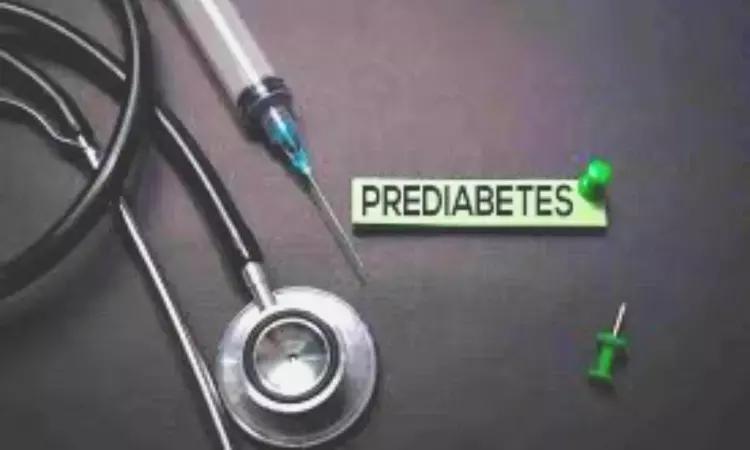More Favorable Modifiable Factors Score Promotes Return Of Blood Sugar Status From Prediabetes To Normoglycemia
- byDoctor News Daily Team
- 10 July, 2025
- 0 Comments
- 0 Mins

South Korea: In individuals with prediabetes, more favorable modifiable factors are linked with a higher chance of returning to normoglycemia (normal blood sugar) and lower odds of progression to type 2 diabetes, says a recent study published in Diabetes Care.
"Prediabetes glycemic status may be reversible, and having a more favorable modifiable factors score may promote the change blood sugar status from prediabetes to normoglycemia." the researchers wrote in their study.
Prediabetes is a critical condition that often progresses to type 2 diabetes (T2D) but is also potentially reversible. Thus, knowing the determinants that may be important for changing prediabetes blood sugar status is critical. However, only a few population-based studies have included modifiable factors to find out their association with changes in glycemic status from diabetes.
Against the above background, Ji-Yeob Choi from Seoul National University College of Medicine in Seoul, Republic of Korea, and colleagues aimed to investigate the associations between modifiable risk factors and blood sugar status changes in people with prediabetes.
The study included 10,358 individuals with prediabetes defined by their HbA1c and fasting blood glucose levels from the Health Examinees-Gem study. Modifiable factors, including abdominal obesity, BMI, physical activity, smoking status, hypertension, diet quality, dyslipidemia, and alcohol consumption, were examined to determine their associations with changes in glycemic status during follow-up. They also analyzed the association of modifiable factor scores with changes in glycemic status. The median follow-up time for the study was four years.
The study outcomes included prediabetes existence, diabetes progression, and normoglycemia reversion.
The study led to the following findings:
BMI ≥25 kg/m2 (adjusted odds ratio [OR] 0.71), abdominal obesity (OR 0.76), heavy drinking (OR 0.74), hypertension (OR 0.71), and dyslipidemia (OR 0.78) were linked with a lower possibility of normoglycemia reversion. BMI ≥25 kg/m2 (OR 1.58), abdominal obesity (OR 1.31), current smoking (OR 1.43), and hypertension (OR 1.26) were associated with a higher probability of type 2 diabetes progression.
More favourable modifiable factors were also associated with normoglycemia reversion (OR 1.46) and type 2 diabetes progression (OR 0.62).
The researchers conclude, "more favorable modifiable factors are linked to a higher odds of returning to normoglycemia and a lower likelihood of progression to type 2 diabetes."
Reference:
Salma Nabila, Ji-Eun Kim, Jaesung Choi, JooYong Park, Aesun Shin, Sang-Ah Lee, Jong-koo Lee, Daehee Kang, Ji-Yeob Choi; Associations Between Modifiable Risk Factors and Changes in Glycemic Status Among Individuals With Prediabetes. Diabetes Care 2023; dc221042. https://doi.org/10.2337/dc22-1042
Disclaimer: This website is designed for healthcare professionals and serves solely for informational purposes.
The content provided should not be interpreted as medical advice, diagnosis, treatment recommendations, prescriptions, or endorsements of specific medical practices. It is not a replacement for professional medical consultation or the expertise of a licensed healthcare provider.
Given the ever-evolving nature of medical science, we strive to keep our information accurate and up to date. However, we do not guarantee the completeness or accuracy of the content.
If you come across any inconsistencies, please reach out to us at
admin@doctornewsdaily.com.
We do not support or endorse medical opinions, treatments, or recommendations that contradict the advice of qualified healthcare professionals.
By using this website, you agree to our
Terms of Use,
Privacy Policy, and
Advertisement Policy.
For further details, please review our
Full Disclaimer.
Tags:
Recent News
Kerala waives Rs 10 lakh discontinuation penalty f...
- 09 November, 2025
Jharkhand health dept announces SOP for ICU and CC...
- 09 November, 2025
Doctors oppose Punjab govt's decision to set up me...
- 09 November, 2025
Biocon gets 2 USFDA observations for Visakhapatnam...
- 09 November, 2025
Daily Newsletter
Get all the top stories from Blogs to keep track.


0 Comments
Post a comment
No comments yet. Be the first to comment!